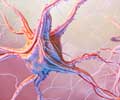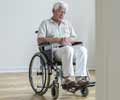Surgical repair procedure combined with gene therapy help in the regeneration of nerve cells and nerve fibers following an accident that has led to nerve damage.
Treatment coupled with gene therapy helps in the fast recovery after nerve damage, reveals a new study. Nerve cells and nerve fibers over a long distance regenerated after a surgical repair procedure and gene therapy. The study published in the journal
Brain is a breakthrough in the development of new treatment of people with nerve damage.//
During birth or following a traffic accident, nerves in the neck can be torn out of the spinal cord. As a result, these patients lose their arm function, and are unable to perform daily activities such as drinking a cup of coffee. Currently, surgical repair is the only available treatment for patients suffering this kind of nerve damage. "After surgery, nerve fibers have to bridge many centimeters before reaching the muscles and nerve cells from which new fibers need to regenerate are lost in large numbers. Most regenerating nerve fiber do not reach the muscles. The recovery of arm function is therefore disappointing and incomplete," explains researcher Ruben Eggers of the NIN.
TOP INSIGHT
In nerve damaged rats, with the combination of surgical repair and gene therapy, many of the lost nerve cells were rescued, and the nerve fibers can be stimulated to grow in the direction of the muscle.
By combining neurosurgical repair with gene therapy in rats, many of the dying nerve cells can be rescued and nerve fiber growth in the direction of the muscle can be stimulated.
In this study, the researchers used regulatable gene therapy with a growth factor that could be switched on and off by using a widely used antibiotic. "Because we were able to switch off the gene therapy when the growth factor was no longer needed, the regeneration of new nerve fibers towards the muscles was improved considerably," says Ruben Eggers.
A stealth gene switch
To overcome the problem of the immune system recognizing and removing the gene switch, the researchers developed a hidden version, a so-called 'stealth switch'. Professor Joost Verhaagen (NIN) explains: "The stealth gene switch is an important step forward towards the development of gene therapy for nerve damage. The use of a stealth switch improves the gene therapy rendering it even safer."
The gene therapy is not yet ready for use in patients. While the ability to switch off a therapeutic gene is a large step forward, the researchers still found small amounts of the active gene when the switch was turned off. Therefore, further research is needed to optimize this therapy.
Source-Eurekalert

 MEDINDIA
MEDINDIA




 Email
Email









